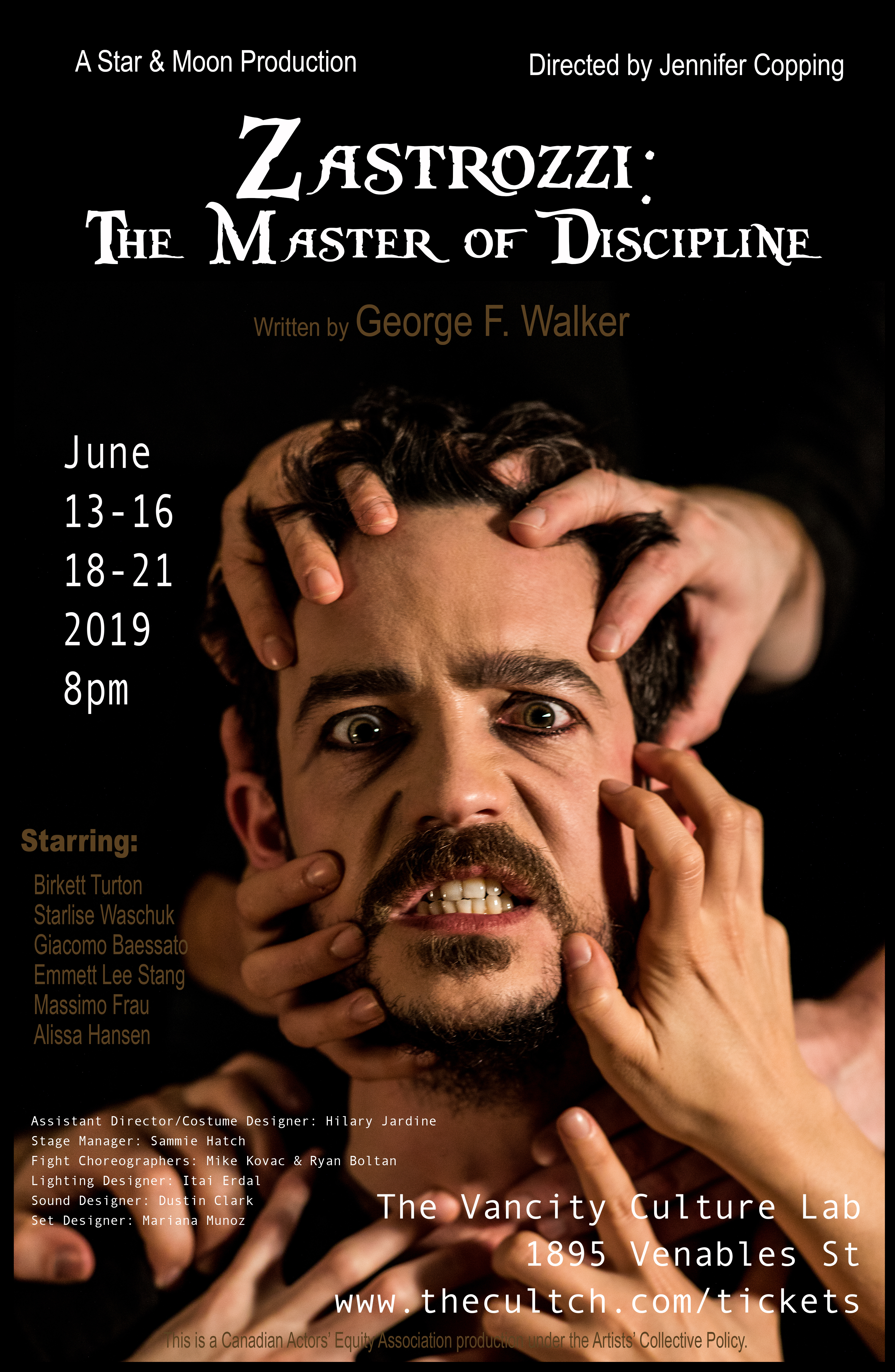
Credit: Amanda Waschuk
At The Cultch June 14-16 and 18-21, 2019
Tickets from $30 at tickets.thecultch.com or 604-251-1363
Posted June 14, 2019
Percy Bysshe Shelley wrote the novella Zastrozzi: A Romance in 1809 when he was just seventeen and still at Eton College. In 1810, when it was published, the reviews, to say the least, were mixed. The reviewer from the Critical Review dismissed it thus: “We know not when we have felt so much indignation as in the perusal of this execrable production. The author of it cannot be too severely reprobated. Not all his ‘scintillated eyes,’ his ‘battling emotions,’ his ‘frigorific torpidity of despair’… ought to save him from infamy, and his volume from the flames.”
Undaunted, Canadian playwright George F. Walker adapted Zastrozzi: A Romance for stage in 1977 not from the novella but from a plot summary of the novella and it has been cropping up on stages ever since. In Walker’s words, Zastrozzi: the Master of Discipline is “rather different from the novel.”
What began as a Gothic-style revenge thriller is now all about cleverness and style. And this Star & Moon Productions’ presentation, under the direction of Jennifer Copping, is definitely stylish.
Mariana Munoz’s set, lit by Itai Erdal, is shadowy, gloomy and prison-like while sound design by Dustin Clark is lush with acoustic guitar, violins and cello. Costume design by Hilary Jardine is, for the most part, evocative of the period. Especially stylish is the black, rucked-up, low-cut and off-the-shoulder gown on dominatrix Matilda (Starlise Waschuk).
But style goes further than costumes and setting. Zastrozzi (Birkett Turton) is not only villainous he’s creepily exaggerated; he’s a Richard III-ish, self-consciously satanic creature, evil made flesh as he peers out at us. Verrezzi (Massimo Frau), the object of Zastrozzi’s obsession for revenge, is silly, petulant, ridiculous in his escalating self-definition from ‘artiste’ to messiah. In short, Walker sends up Shelley’s characters and the issues mercilessly – although, the novella (even the plot summary thereof) simply begs for sending up.
Style carries Act 1: it’s fun. But by Act 2, style is not enough. The arguments against religion and for atheism are not all that interesting anymore. What in Shelley’s hands might have been spine chilling is smarty-pants dialectic in Walker’s. It’s darkly funny and we do want to know if the bad guy (whoever that is) will successfully wreak revenge on the good guy (whoever that is). Some clever, gender politically-motivated playwright might want to take a crack at a turnabout play, Matilda: Zastrozzi’s Nemesis. Waschuk could certainly make that interesting.
Here’s a plot summary from the plot summary: Zastrozzi, the half-brother of mediocre artist Verrezzi, is obsessed with taking revenge on him for their mutual father’s murder of Zastrozzi’s mother. Not clear is why Zastrozzi holds Verrezzi responsible for the crime their father committed. Sins of the father? And besides, Zastrozzi admits to having bludgeoned and murdered his way across Europe from Germany to Italy and back. But why? Because he could?
Matilda, a whore, is in love with Zastrozzi but he is, in his own words, “pre-occupied.” And why is Matilda obsessed with Zastrozzi? “The whore sleeps with the devil so she can feel like a virgin.” Is that it?
The virgin in the play is Julia (Alissa Hansen) and in one of the most interesting scenes in the play, Zastrozzi deflowers her without touching her. The power of suggestion is enough to get her hot and bothered.
Both Zastrozzi and Verrezzi have protectors. Verrezzi has Victor (Emmett Lee Stang), a god-fearing cleric sworn by Verrezzi’s father to look after the gentle but crackpot son. And Zastrozzi has Bernardo (Giacomo Baessato), a bouncer kind of guy with a slightly British accent. Baessato is delightfully thick-headed and when Zastrozzi orders Bernardo to kill Victor “with some imagination”, Baessato signals his character’s complete inability to comprehend what that might mean.
In the midst of all the silliness, there is some mighty fine swordplay, choreographed by Mike Kovac and Ryan Bolton. Front row in The Cultch’s Culture Lab probably provides more chills and thrills than the play itself.
More dead bodies than Hamlet. And a lot less substance. But as the producer Starlise Waschuk writes in her program notes, “maybe we are all in need of some laughter.”

